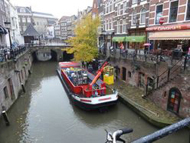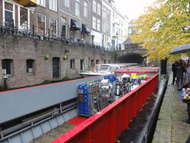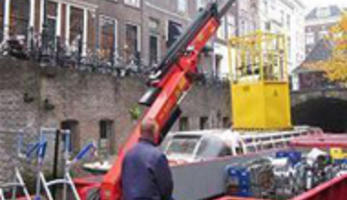City distribution by boat
Thematic areas
Urban logistics
Summary
Freight traffic is a problem in the old city centre of Utrecht. The city already started to take advantage of the centre’s good accessibility by waterways and wanted to further exploit the potential for waterborne freight distribution.
Implementing sustainable mobility
Truck-based freight distribution is a major concern in Utrecht’s city centre. Heavy vehicles damage the historical culture heritage of the city and cause nuisance in the form of accidents, noise and air pollution. The city council has therefore introduced a number of vehicle restrictions in the inner city including time windows for freight traffic to deliver goods and a low emission zone. But, since good accessibility is crucial for the city’s economic viability, it was also decided to expand the existing water transport with the introduction of a zero-emission electrical vessel to transport goods to clients, shops, bars and restaurants in the city centre. The concept is known as the 'Beer Boat' since the vessel initially transported mainly beer and beverages to catering businesses along the canals.
The MIMOSA measure consists of the implementation of a new electric vessel and a search for new customers and suppliers to increase transported volumes. Utrecht had set itself the objective to:
• Decrease road goods traffic in the city centre; and
• Make better use of the potential for waterborne transport for supplying the city.
Progress
 Before the development and implementation of the zero emission vessel, a study was conducted to calculate the saved emissions compared to freight traffic and compared to the diesel powered vessel. The potential contribution of the (zero emission) Beer Boat to cleaner air in Utrecht was investigated, thus justifying its funding. Since January 2010 it navigates Utrecht canals.
Before the development and implementation of the zero emission vessel, a study was conducted to calculate the saved emissions compared to freight traffic and compared to the diesel powered vessel. The potential contribution of the (zero emission) Beer Boat to cleaner air in Utrecht was investigated, thus justifying its funding. Since January 2010 it navigates Utrecht canals.
Following the launch of the new zero emission boat, more transport capacity became available. Not only did the new boat have greater capacity than the old vessel, but the old vessel also remained available for new customers. A market survey and feasibility study was conducted to investigate the potential for new customers and new suppliers – not only catering businesses but also other branches - for waterborne transport in the Utrecht city centre. The study showed that there was enough potential to justify another vessel. It also showed that there were a lot of opportunities to expand the possibilities of waterborne transport by collaborating with different transporters. The market survey in 2010 was extended with a further exploration of the market in 2010 and 2011.
As a result of the MIMOSA electric Beer Boat, in the summer of 2011 the City of Utrecht signed a contract for another electric 'Multi Purpose Vessel'. This Multi Purpose Vessel replaced the existing garbage boat which had been running in Utrecht to collect garbage from businesses on the wharves. In April 2012, the ‘Ecoboot’ was launched. Further Expansion of the market for waterborne transport was postponed after the introduction of the ‘Ecoboot’.
Outcomes
 The Beer Boat has made positive contributions to overall accessibility and liveability in the city centre, making important contributions to air quality, noise reduction, safety and congestion levels. Due to the many positive effects of the Beer Boat it is considered one of Utrecht’s most popular MIMOSA measures gaining much attention and recognition at the national and international level. The success of the measure and decision-makers´ enthusiasms for the project ensures the expansion and the sustainability of the Beer Boat in a long-term perspective.
The Beer Boat has made positive contributions to overall accessibility and liveability in the city centre, making important contributions to air quality, noise reduction, safety and congestion levels. Due to the many positive effects of the Beer Boat it is considered one of Utrecht’s most popular MIMOSA measures gaining much attention and recognition at the national and international level. The success of the measure and decision-makers´ enthusiasms for the project ensures the expansion and the sustainability of the Beer Boat in a long-term perspective.
The Beer Boat is currently operating 6 times on 4 days per week, supplying more than 60 catering businesses. Market exploration showed opportunities to increase the volume of goods transported to current clients and two wholesale companies have shown interest in the service which could additionally increase the number of trips in the near future.
Additionally to the impact and process evaluations, a cost-benefit analysis (CBA) was conducted. The results of the impact evaluation showed that the implementation of the electric Beer Boat had immediate positive effects on air quality, noise, safety and overall liveability in the city centre. The key results are as follows:
• Introduction of a zero emission vessel gave immediate emission benefits of 38 tonnes saved CO2, 31 kg saved NOx and 6 kg saved PM10 emissions, during the CIVITAS MIMOSA period. For the total estimated city centre emissions this means a decrease in CO2 emissions of 13%, NOx emissions by 6% and PM10 emissions by 10% in the MIMOSA lifespan. As the Beer Boat has a longer life time, emission savings will continue in the future.
• A zero emission vessel is a low risk investment in Utrecht as the client base is big enough and stable and there are many profits. Overall, the Beer Boat measure is yielding a net present value (NPV) of well over €420.000 at a 3.5% discount rate. It is assumed that impacts that were not part of the CBA have additional positive effects and thereby further increase the calculated NPV. Furthermore, the Beer Boat is already profitable with very low freight loads.







